

Larger Versions of these photographs can be reached by clicking on them.
THE PHOTOGRAPHS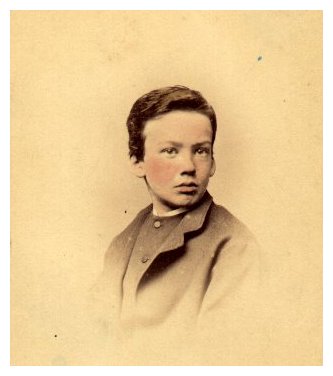
A dated, portrait photo of JMF, aged 10, in 1868. *****************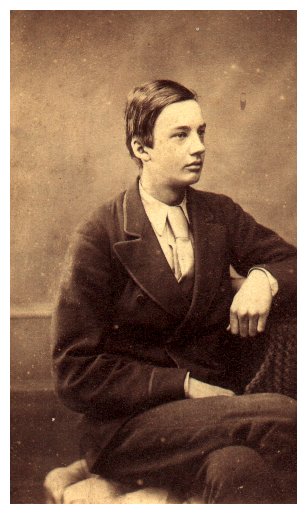
JMF probably in his teens in an undated portrait.
***************** Another undated portrait, but here he looks very much as he does in a published photograph of him with members of the Noble household in 1883 where he was employed as a tutor. *****************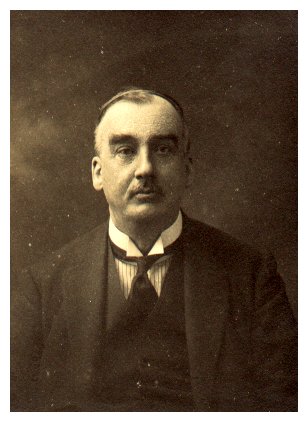
JMF photo dating from about 1915 ******************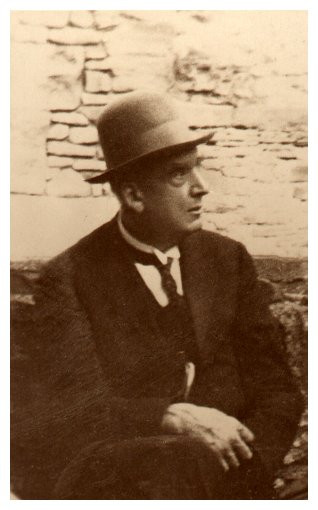
JMF on a picture postcard, about 1920. ******************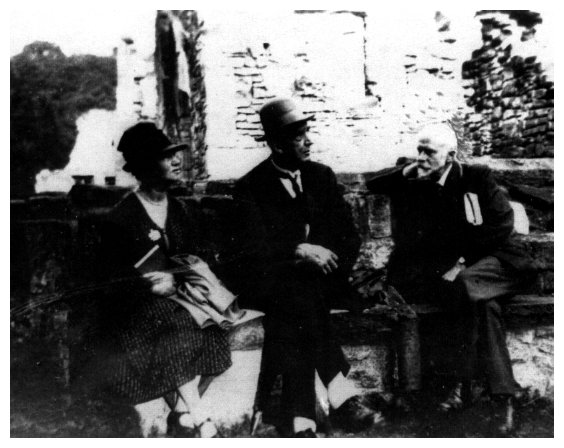
The original snap from which the postcard above was made.
This came from a family photograph album dated 1929-1932.
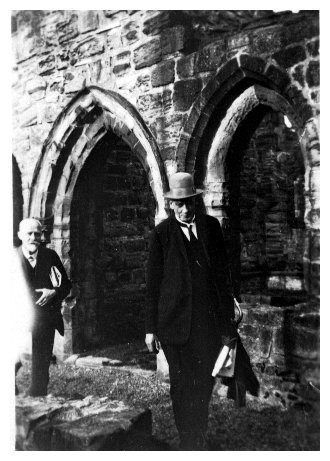
Another snapshot of JMF poking about in the ruins of Finchale Abbey, about 1930. With Edward S. in the background. ********************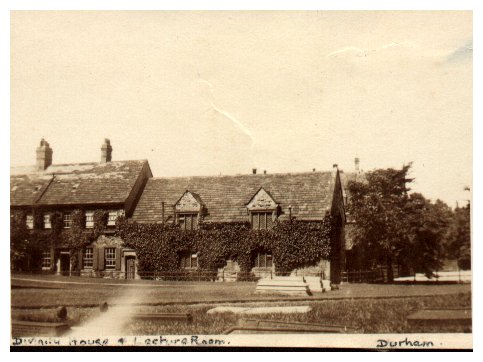
The Divinity House, Durham, which JMF bought in 1899 and in which he lived until his death in
1932.
******************** The Garden at the back of Divinity House. In the distance is Durham Cathedral. ********************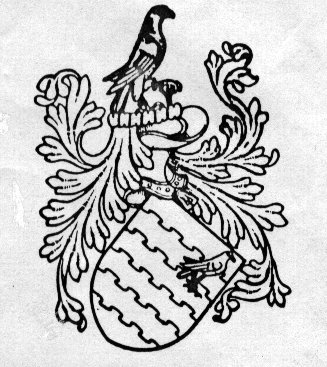
Coat of Arms granted to JMF, and other descendants of his father, in 1905. ********************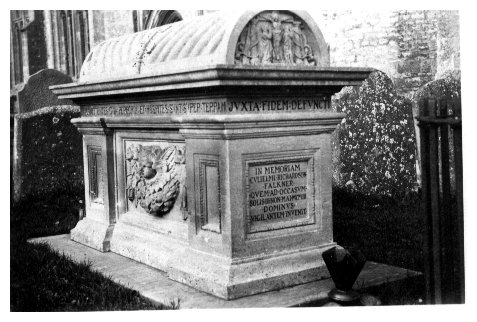
Joint Tomb of John Meade Falkner and his brother, William Richardson Falkner, in Burford. |
A BRIEF BIOGRAPHYHis Beginnings and His FamilyJohn Meade Falkner, born on May 8th.,1858, in Manningford Bruce, a village in Wiltshire, England, was the second son (the first having died before JMF was born) of Thomas Alexander Falkner (1819-87) and his wife, Elizabeth Grace (Mead).His father, the village curate, was a reclusive scholar. Well-versed in the classics, he was able but unambitious and never rose any higher in the church than 'Curate-in-Charge'. Other members of the family comprised: two sisters, Mary Grace(1856-1901) and Anne Louisa (1862-1933), as well as two younger brothers, Charles Gaskell (1864-1932) and William Richardson (1867-1902). His Education:JMF's formal education started with Latin lessons from his mother, commencing on his fifth birthday, and Greek from his father on his 6th.. These two excellent teachers imbued him with a life-long love of classical learning.His outside schooling started at Hardye's School in Dorchester (whose Headmaster, Ratsey Maskew, provided not only those memorable names for a couple of 'Moonfleet' characters, but also a daughter, Katie - JMF's first love - on whom the character Grace Maskew was probably based.) When his father took a new position in Weymouth, Dorset, in 1871, the family moved to there and JMF's education was continued at Weymouth Grammar School (now W. College). By the age of 14, he had reached 6ft in height and was still growing, only stopping at 6ft.9in. He spent the years 1873-77 at Marlborough College working towards a University entrance, he also bicycled all over the local countryside and it was at MC that he produced his first poetry. As an Oxford undergraduate(1878-82), JMF read Modern History at Hertford College but emerged with only a very modest Third Class Degree. Nevertheless, he had broadened his fields of interest enormously and had mastered several modern languages in addition to his early classical ones. His first employment:In January 1883, JMF met John Noble, then an Eton schoolboy having problems preparing for his Oxford University entrance examinations. After meeting the rest of the family he was hired as a tutor for John by the father, Andrew Noble. Andrew was the operational head of Armstrong & Co., a world-ranking engineering and armaments firm that was later to become Armstrong Mitchell & Co. and, later still, Armstrong Whitworth.So JMF became a member of the Noble household, almost one of the family, tutoring first John then the younger children as needed and, when, about 1885, these responsibilities disappeared, becoming a personal secretary to Andrew Noble. In 1887, his father, Thomas Falkner died intestate (his mother, Elizabeth Grace having died in 1871) and the family income, based, as it was, on a marriage settlement, ended with this death. The Falkner family fell on hard times - they even had to take in lodgers! JMF, however, was doing well enough by then to put both his brothers through Cambridge University and his sisters through Art School (Anne moved to London in 1889, attended the Slade School of Art, and went on to a successful career as a painter). His Business Career:In 1888 he was made Company Secretary to Armstrong Mitchell & Co. Because of his abilities and Noble family contacts, his climb was rapid; he became Secretary to the newly amalgamated Armstrong Whitworth Co. in 1897 and a director in 1901. His command of foreign languages, which allowed him to negotiate for the company directly with foreign governments as well as follow military reports from around the world, made him an invaluable member of the firm; so much so that, in 1915, at the height of WWI, he was elected Chairman of the Board of AW; Remember that this was a world-class armaments company that was a major staple of Britain's war effort. Such a position is seldom occupied by one mainly thought of as a novelist, poet and aesthete (for very long at least)! But he held this post until 1920 and remained a member of the board until finally retiring in 1926. His lucrative career easily financed his growing collection of old books and medieval manuscripts.His Marriage:In 1899, at the age of 40, he had married Evelyn Violet Adye who was then 29. The marriage lasted the rest of his life, but seems to have been, on his part at least, a relatively passionless affair, for he appears to have been a natural celibate. There were no children. Shortly afterwards the couple moved into 'Divinity House' in Durham, a home he was to occupy until he died. Evelyn was very definitely the junior member of this partnership and he never referred to her opinion on any subject; he seems to have had a very low opinion of female capabilities in general.His Career as a Writer:His first book, A Pocket Guide to Oxfordshire was published in 1894. This was followed by The Lost Stradivarius (1895), Moonfleet (1896) and, in 1899, A History of Oxfordshire. His last books were A Pocket Guide to Berkshire (1902), and The Nebuly Coat (1903). He had been writing poetry ever since his days at Marlborough, but, as his health worsened, and his interest in ecclesiastical affairs increased, his poetic output declined considerably.His Retirement:In retirement, he became deeply involved in both the Durham University, where he was Honorary Reader in Paleography and the Durham Cathedral where he was Honorary Librarian to the Dean and Chapter. He died on July 22, 1932, in the same year that his one remaining brother, Charles, died, and fourteen months before this writer was born.JMF's Family Tree
can be found | ||
|
MR. J. M. FALKNER | |||
|
|
|||
If you are interested, you can email
Kenneth Hillier now,
or snailmail him at:
Greenmantle, Main Street, King's Newton, Melbourne,
Derbyshire, England, U.K. DE73 1BX
The Society's Newsletters and some other publications are being put up here
as they become available to me.
The JMFS JOURNAL is available to members only.
Below are links to the publications to date.
| Newsletter #1 July 1999 |
Newsletter #2 January 2000 |
Newsletter #3 May 2000 |
| Newsletter #4 July 2000 |
Newsletter #5 January 2001 |
Newsletter #6 May 2001 |
| Newsletter #7 July 2001 |
Newsletter #8 January 2002 |
Newsletter #9 May 2002 |
| Newsletter #10 July 2002 |
Newsletter #11 January 2003 |
Newsletter #12 May 2003 |
| Newsletter #13 July 2003 |
Newsletter #14 January 2004 |
|
| Imperious Tyranny and Infinite Gusto JMF the Sportsman! |
A Second-Rate War JMF on The Boer War. |
Accident or Foul Play? A Nebuly mystery! |
![]()
The JMF Society is now a member of
![]()
The Alliance of Literary Societies.
MOONFLEET: A Study Guide
JMF Biography from
Hertford College
ALLEN & UNWIN
Offers readings of Moonfleet on CDs and cassettes.
(Note to John Blaauwendraat: your email return address doesn't work)
TARTARUS PRESS
Has published a limited edition (300 copies) of "The Lost Stradivarius".
Also included in this well-bound, 233-page hardcover book are
the seldom seen stories: "A Midsummer Night's Marriage" and "Charalampia".
All of this is topped off with an introduction by Mark Valentine, and one of my
photographs!
A "Must Have" for Falkner Fans!
![]()
|
|
|
This page was created using Paint Shop Pro by JASC.
Last Modified on 06 January 2004.